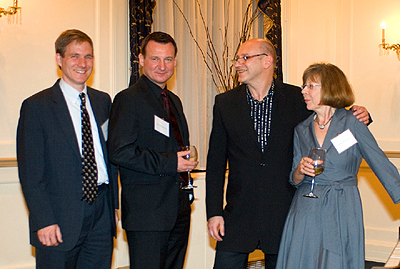From the Director

Randall Stone's new book. Available at
amazon.com and cambridge.org .
On the other hand, while the U.S. economy is recovering, the financial crisis in Europe continues to deepen. After the unprecedented financial rescue plan for Greece in 2010, Ireland and then Portugal lost the confidence of financial markets in 2011 and were driven to the EU and the IMF for financial bail-outs. Caught between increasing euro-skepticism at home and the overexposure of its own banks, the German government insisted on very tough conditions for these loans, which led to a deep recession in the so-called “PIGS.” It is now evident that Greece will not meet its budget targets for this year, and it is likely that it will have to reschedule its debt in order to avoid outright default. This can be expected to raise interest rates and increase pressure on other highly-indebted countries in Europe. Poland, the best-performing country in Europe, now appears farsighted for not rushing into the Euro Zone, because it avoided the worst of the financial crisis by devaluing the złoty.
Developments in the region are fluid, but one thing is certain: Central European politics remains important, complex and in need of interdisciplinary study. The Skalny Center is moving ahead with several initiatives. Three years ago, we helped to launch a new undergraduate major in International Relations, and this year we celebrated the graduation of 43 “IR” majors. This spring, we signed a three-year renewal of the University of Rochester exchange with Jagiellonian University in Krakow, and we expanded it to include tuition and housing waivers for participating Polish students. This represents an annual commitment of approximately $100,000 by the University of Rochester. The high level of tuition in Rochester had prevented the student exchange from being financially feasible for the Polish side in the past, and we hope that this new initiative will lead to a significant expansion of ties with Krakow. Another exciting initiative is the Program on International Politics and Business, sponsored by a gift from Robert Klimasewski. The program is supporting an academic conference in Krakow on June 4-8 on “Multinational Corporations in World Politics,” which will bring together leading academics and business professionals to discuss the politics and implementation of foreign direct investment.
Our first event of this academic year was a special program to celebrate the 150th birth anniversary of Ignacy Jan Paderewski (1860–1941), a virtuoso pianist, composer, statesman (the first Prime Minister of independent Poland after World War I), humanitarian and orator. Paderewski was acclaimed a "Modern Immortal" by his contemporaries. The program included performances of Paderewski’s compositions by Igor Lipinski of the Eastman School of Music, readings of Paderewski’s letters and press reviews about him interpreted by Dr. Matthew Ames, Assistant Professor of Theater Arts at Nazareth College, and fragments of films. His remarkable links to Rochester are described in Kathleen Urbanic’s article in this newsletter.

Randall Stone, Robert Więckiewicz, Włodek Pawlik and Bozena Sobolewska at the grand opening of the Film Festival
Our evening lectures covered a broad spectrum of topics, including a lecture on the emergence of avant-guarde jazz in Poland during the Cold War by Dr. Zbigniew Granat (Nazareth College) and on Father Maximilian Kolbe by Dr. Kazimierz Braun (University at Buffalo.) I celebrated the publication of my new book this spring by giving a lecture about global governance and the role of international organizations. The book, Controlling Institutions: International Organizations and the Global Economy, was published by Cambridge University Press in March. Polish poet and translator Piotr Sommer was the Skalny visiting professor this spring, and he participated in a discussion of poetry, the mutual influences of Polish and Anglo-American poets, and issues of translation. A short article about Piotr Sommer by Kathleen McGarvey was published in the spring edition of Rochester Review and is reprinted in this Newsletter. The Center hosted Olesya Tkacheva (Ph.D. 2009, University of Michigan) as a post-doctoral fellow, and she gave a talk about her research on party politics in Eastern Europe, and presented a paper about the role of the internet in Polish parliamentary elections. The last event of the spring semester was a celebration of the 100th birth anniversary of Czesław Miłosz. Professor David Weiss of Hobart and William Smith Colleges spoke about the life and work of Czesław Miłosz, who was one of Poland’s greatest cultural figures and a Nobel Prize-winning poet, essayist, translator and scholar.
The Skalny Center offers courses in the Polish language, and enrollments have increased in recent years. This year, students took both beginning and intermediate level courses and a course on life in present-day Poland, created for advanced students. In addition, the Center sponsors a summer study-on-location program in Krakow. During the 4-week program, offered through the Jagiellonian University School of Polish Language and Culture, students take courses on Polish language, Polish history, Polish literature, or communism and democracy in Eastern Europe. Thanks to a generous gift by the late Joseph Skalny, four undergraduate students and one graduate student were awarded scholarships to help them participate in the program, and a graduate student in Art and Art History Department received a scholarship to do research in Poland during the spring of 2011.
I hope to see you at some of our events next year. Please keep in mind the following upcoming events in fall 2011:
■ Lecture by Kathleen Parthe titled “For their freedom and ours: Alexander Herzen and the liberation of Poland” – Oct. 13
■ Lecture by Skalny Visiting Professor, Anna Niedzwiedz – Dec. 11
■ Opening of the Polish Film Festival, Nov. 10
■ Polish Film Festival, Nov. 11 – Nov. 14, the Little Theatre
■ Concert – Dec 4



